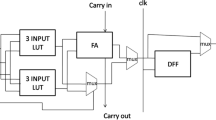Abstract
Digital signal processing besides multimedia applications needs plenty of data, real-time processing capacity, and high computational power. Thus, adaptable architectures with run-time reconfiguration abilities have gotten expanded consideration. Basically, Reconfiguration computing is going towards advancing the application adaptability at runtime. A reconfigurable structure can be attained by working up the strategy aimed at configuring an array of programmable logic reprogramming. Field Programmable Gate Arrays (FPGAs) is made with the intention of reconfiguring the array system with interconnects as well as the configuration of logic blocks. To implement a high-performance FPGA device and also to enhance, the given paper proposes a proficient design strategy. The proposed strategy count upon the employment of dynamic partial reconfiguration (DPR) to drive from one mode then onto the next utilizing time-multiplexing on the same chip region. Furthermore, reconfigure modules to spare considerable area and enable the low-cost FPGAs usage. In the given work, reconfigurations of the modules accompanied by the memory are finished. The DPR is implemented betwixt these modes to shift from one mode then onto the next. The proposed method helps in diverse applications with various demands and also attains high performance, power consumption together with throughput. The proposed work gives improved performance with fewer powers and less area utilization which is illustrated by the Experimental outcomes.









Similar content being viewed by others
References
Liu, B., Wang, B.: Reconfiguration-based VLSI design for security. IEEE J. Emerg. Sel. Top. Circuits Syst. 5(1), 98–108 (2015)
Contreras, L., Cruz, S., Mauricio, J., Motta, S.T., Llanos, C.H.: FPGA implementation of the EKF algorithm for localization in mobile robotics using a unified hardware module approach. In: 2015 International Conference on ReConFigurable Computing and FPGAs (ReConFig), pp. 1–6. IEEE (2015)
Nafkha, A., Louet, Y.: Accurate measurement of power consumption overhead during FPGA dynamic partial reconfiguration. In: 2016 International Symposium on Wireless Communication Systems (ISWCS), pp. 586–591. IEEE (2016)
Nouri, S., Hussain, W., Nurmi, J.: Design and evaluation of correlation accelerator in IEEE-802.11 a/g receiver using a template-based coarse-grained reconfigurable array. In: Nordic Circuits and Systems Conference (NORCAS): NORCHIP & International Symposium on System-on-Chip (SoC), 2015, pp. 1–6. IEEE (2015)
Alawad, M., Lin, M.: Energy-efficient imprecise reconfigurable computing through probabilistic domain transformation. In: Circuits and Systems Conference (DCAS), 2014 IEEE Dallas, pp. 1–4. IEEE (2014)
Nam, N., Lysecky, R.: Latency, power, and security optimization in distributed reconfigurable embedded systems. In: 2016 IEEE International Parallel and Distributed Processing Symposium Workshops, pp. 124–131. IEEE (2016)
Chen, Y.-G., Wen, W.-Y., Wang, Y.-T., Lee, Y.-L., Chang, S.-C.: A novel low-cost dynamic logic reconfigurable structure strategy for low power optimization. In Design Automation Conference (ASP-DAC), 21st Asia and South Pacific, pp. 250–255. IEEE (2016)
Gazzano, J.D.: Integrating FPGAs: a dynamically reconfigurable FPGA-based grid for high performance computing. In: International Conference on Advances in Electrical, Electronic and Systems Engineering (ICAEES), pp. 1–4. IEEE (2016)
Meidanis, D., Georgopoulos, K., Papaefstathiou, I.: FPGA power consumption measurements and estimations under different implementation parameters. In: 2011 International Conference on Field-Programmable Technology (FPT), pp. 1–6, IEEE (2011)
Frédéric, A., Thomas, E., Vashishtha, V.: Power consumption improvement with residue code for fault tolerance on SRAM FPGA. In 2011 Conference on Design and Architectures for Signal and Image Processing (DASIP), pp. 1–6. IEEE (2011)
Chtourou, S., Marrakchi, Z., Abid, M., Mehrez, H.: Power consumption analysis for mesh based FPGA. In: 2014 9th IEEE International Conference on Design & Technology of Integrated Systems In Nanoscale Era (DTIS), pp. 1–5, IEEE (2014)
Lawal, N., Lateef, F., Usman, M.: Power consumption measurement & configuration time of FPGA. In: Power Generation System and Renewable Energy Technologies (PGSRET), 2015, pp. 1–5, IEEE. (2015)
Collier, R., Fobel, C., Pattison, R., Grewal, G., Areibi, S., Jamieson, P.: Advancing genetic algorithm approaches to field programmable gate array placement with enhanced recombination operators. Evol. Intel. 7(4), 183–200 (2014)
Palumbo, F., Fanni, T., Sau, C., Meloni, P.: Power-awarness in coarse-grained reconfigurable multi-functional architectures: a dataflow based strategy. Journal of Signal Processing Systems 87(1), 81–106 (2017)
Fengbin, T., Yin, S., Ouyang, P., Tang, S., Liu, L., Wei, S.: Deep convolutional neural network architecture with reconfigurable computation patterns. IEEE Trans. Very Large Scale Integr. VLSI Syst. 25(8), 2220–2233 (2017)
Zheng, Yu., Zhiyi, Yu., Xueqiu, Yu., Liu, N., Zeng, X.: Low-power multicore processor design with reconfigurable same-instruction multiple process. IEEE Trans. Circuits Syst. II Express Briefs 61(6), 423–427 (2014)
Liu, L., Wang, D., Yin, S., Chen, Y., Zhu, M., Wei, S.: SimRPU: a simulation environment for reconfigurable architecture exploration. IEEE Trans. Very Large Scale Integr. VLSI Syst. 22(12), 2635–2648 (2014)
Amin, R., Martin, J., Deaton, J., DaSilva, L.A., Hussien, A., Eltawil, A.: Balancing spectral efficiency, energy consumption, and fairness in future heterogeneous wireless systems with reconfigurable devices. IEEE J. Sel. Areas Commun. 31(5), 969–980 (2013)
Purohit, S.S., Chalamalasetti, S.R., Margala, M., Vanderbauwhede, W.A.: Design and evaluation of high-performance processing elements for reconfigurable systems. IEEE Trans. Very Large Scale Integr. VLSI Syst. 21(10), 1915–1927 (2013)
Prabhu, G.R., Johnson, B., Rani, J.S.: FPGA based scalable fixed point QRD core using dynamic partial reconfiguration. In: 2015 28th International Conference on VLSI Design (VLSID), pp. 345–350, IEEE (2015)
Vipin, K., Fahmy, S.A.: Mapping adaptive hardware systems with partial reconfiguration using CoPR for Zynq. In: 2015 NASA/ESA Conference on Adaptive Hardware and Systems (AHS), pp. 1–8, IEEE (2015)
Author information
Authors and Affiliations
Corresponding author
Rights and permissions
About this article
Cite this article
Saravana Ram, R., Gopi Saminathan, A. & Arun Prakash, S. An Area Efficient and Low Power Consumption of Run Time Digital System Based on Dynamic Partial Reconfiguration. Int J Parallel Prog 48, 431–446 (2020). https://doi.org/10.1007/s10766-018-0578-6
Received:
Accepted:
Published:
Issue Date:
DOI: https://doi.org/10.1007/s10766-018-0578-6




